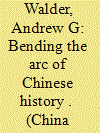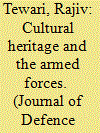| Srl | Item |
| 1 |
ID:
148764


|
|
|
|
|
| Summary/Abstract |
Contrary to its initiators’ intentions, the Cultural Revolution laid political foundations for a transition to a market-oriented economy whilst also creating circumstances that helped to ensure the cohesion and survival of China's Soviet-style party-state. The Cultural Revolution left the Chinese Communist Party and civilian state structures weak and in flux, and drastically weakened entrenched bureaucratic interests that might have blocked market reform. The weakening of central government structures created a decentralized planned economy, the regional and local leaders of which were receptive to initial market-oriented opportunities. The economic and technological backwardness fostered by the Cultural Revolution left little support for maintaining the status quo. Mao put Deng Xiaoping in charge of rebuilding the Party and economy briefly in the mid-1970s before purging him a second time, inadvertently making him the standard-bearer for post-Mao rebuilding and recovery. Mutual animosities with the Soviet Union provoked by Maoist polemics led to a surprising strategic turn to the United States and other Western countries in the early 1970s. The resulting economic and political ties subsequently advanced the agenda of reform and opening. China's first post-Mao decade was therefore one of rebuilding and renewal under a pre-eminent leader who was able to overcome opposition to a new course. The impact of this legacy becomes especially clear when contrasted with the Soviet Union in the 1980s, where political circumstances were starkly different, and where Gorbachev's attempts to implement similar changes in the face of entrenched bureaucratic opposition led to the collapse and dismemberment of the Soviet state.
|
|
|
|
|
|
|
|
|
|
|
|
|
|
|
|
| 2 |
ID:
114919


|
|
|
|
|
| Publication |
2012.
|
| Summary/Abstract |
Imagine if there is a war between India and Pakistan and the National Museum at New Delhi was vandalized and precious historical artifacts and other historical objects were stolen; or close your eyes and visualize India without the Taj Mahal which may be destroyed in an air attack. The standing bodhisattvas, dating back to seventh century AD, and the arms and armours of the Mughal era are some of the fabulous cultural wealth stored in the National Museum that is priceless for the nation and the loss of which can be the loss of the entire golden history of that era. That is literally what has happened to the Iraq National Museum in Baghadad (the Archaeological Institute of America has raised concern on the subject). Many artifacts contained in the museum were excavated from what has come to be known as the "Cradle of Civilisation" and artifacts-like a Sumerian marble head of a woman from Warka, dated 3000 BC and measuring 20 cm high-were found stolen from the National Museum in Baghdad. The fog of war and the instability that followed led to the looting and disappearance of thousands of such priceless artifacts from Baghdad National Museum and have sent alarm bells ringing regarding the preservation of cultural heritage in any armed conflict. The Chinese Cultural Revolution was another example of what harm can be done to the cultural heritage and how history can be obliterated and precious artifacts destroyed in the event of hostility breaking out.
|
|
|
|
|
|
|
|
|
|
|
|
|
|
|
|
| 3 |
ID:
148770


|
|
|
|
|
| Summary/Abstract |
Song Binbin, the daughter of prominent CCP politician Song Renqiong, has long been accused of having played a role in the death of Bian Zhongyun which took place at the Girls' Middle School in Beijing Normal University on 5 August 1966. In January 2014, she publicly apologized for the violence that occurred at her school during the summer of 1966. However, instead of applauding her act of contrition, rebel participants of the Cultural Revolution used the opportunity to criticize the sons and daughters of high-ranking cadres and to try to overturn the 1981 official evaluation of the Cultural Revolution by promoting a positive view of that period in Chinese history. This paper analyses the background, consequences and implications of Song Binbin's apology from a political science cum memory studies perspective. It argues, against the background of a changing political landscape in the People's Republic of China, that the memory of the Cultural Revolution remains a battlefield of divergent memory groups and multiple narratives. In the memory of today, the struggles of the Cultural Revolution have still not come to an end.
|
|
|
|
|
|
|
|
|
|
|
|
|
|
|
|